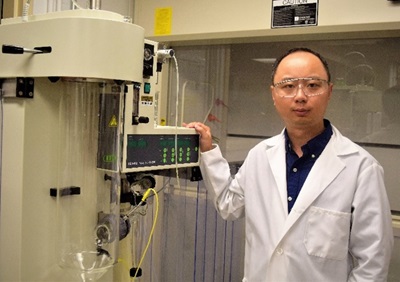
Tony Zhou, associate professor of industrial and molecular pharmaceutics, recently received a third National Institutes of Health (NIH) grant to support his world-leading research program in developing novel inhalation therapeutics fighting antimicrobial resistance.
The $2.4 million grant was awarded to Zhou to lead a multi-national team of top antimicrobial experts from Australia, Thailand, and the US, to fight the issue.
"Antimicrobial resistance is one of the greatest threats to human health," Zhou said. "Gram-negative ‘superbugs’ Klebsiella pneumoniae, Pseudomonas aeruginosa, and Acinetobacter baumannii, have been highlighted by the Infectious Diseases Society of America, Centers for Disease Control, and NIH, among the top dangerous multidrug resistant (MDR) microorganisms. Unfortunately, the progress to develop novel antibiotics is slow, and lung infections caused by these resistant pathogens are deadly."
Zhou and the team, which includes university professors and hospital physicians, are supported by six federal grants totaling $10 million, including three NIH R01 grants. R01 grants provide support for health-related research and development based on the mission of the NIH. The team has built a world-leading research program targeting antimicrobial resistance, aiming to develop new inhalation medicines for treatment of resistant bacterial infections in the lungs.
So far, the research program has yielded two US patents, four patent applications and 70 publications in peer-reviewed journals. The ultimate goal is commercialization of life-saving treatments, Zhou said.
"Commercialization of these inventions is progressing," he said. "We have a goal to develop viable pharmaceutical products for effective treatment of deadly resistant bacterial lung infections."
Learn more about Zhou's research program at https://www.imph.purdue.edu/faculty/zhou659.

